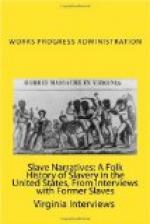CLAYBORN GANTLING
Clayborn Gantling was born in Dawson, Georgia, Terrell County, January 20, 1848 on the plantation of Judge Williams.
Judge Williams owned 102 heads of slaves and was known to be “tolable nice to ’em in some way and pretty rough on ’em in other ways” says Mr. Gantling. “He would’nt gi’ us no coffee, ’cept on Sunday Mornings when we would have shorts or seconds of wheat, which is de leavins’ of flour at mills, yu’ know, but we had plenty bacon, corn bread, taters and peas.
“As a child I uster have to tote water to de old people on de farm and tend de cows an’ feed de sheep. Now, I can’ say right ’zackly how things wuz during slavery ’cause its been a long time ago but we had cotton and corn fields and de hands plowed hard, picked cotton grabbled penders, gathered peas and done all the other hard work to be done on de plantations. I wuz not big ’nuff to do all of dem things but I seed plenty of it done.
“Dey made lye soap on de farms and used indigo from wood for dye. We niggers slept on hay piled on top of planks but de white folks had better beds.
“I don’t ’member my grandparents but my mas was called Harriet Williams and my pa was called Henry Williams; dey wuz called Williams after my master. My mas and pa worked very hard and got some beatings but I don’t know what for. Dey wuz all kinds of money, five and ten dollar bills, and so on then, but I didn’t ever see them with any.
“When war came along and Sherman came through the old people wuz very skeered on account of the white owners but there was no fighting close to me. My master’s sons Leo and Fletcher joined the army and lots of de other masters went; de servants wuz sent along to wait on de young white men. Guess you’d like to know if any were killed. ‘I should smile,’ two I know were killed.
“During those days for medicine, the old people used such things as butterfly root and butterfly tea, sage tea, red oak bark, hippecat—something that grow—was used for fevers and bathing children. They wuz white doctors and plenty of colored grannies.
“When de Yankees came they acted diffunt and was naturally better to servants than our masters had been; we colored folks done the best we could but that was not so good right after freedom. Still it growed on and growed on getting better.
“Before freedom we always went to white churches on Sundays with passes but they never mentioned God; they always told us to be “good niggers and mind our missus and masters”.
“Judge Williams had ten or twelve heads of children but I can’ ’member the names of ’em now; his wife was called Mis’ ‘Manda and she was jes’ ’bout lak Marse Williams. I had ’bout eighteen head of boys and five girls myself; dere was so many, I can’ ’member all of dem.”
Mr. Gantling was asked to relate some incidents that he could remember of the lives of slaves, and he continued:




